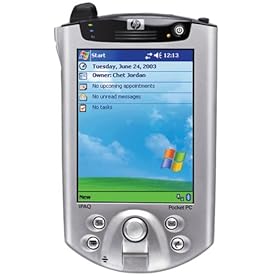Who's The Man Now, Dawg?*
Topic: Tech
 There's a new game in town, and for my money, this machine is eating up the action. We've spent a good deal of time here at What the Thunder Said... coming up with what makes the best Pocket PC device, and this one has it. Now there may be detractors (EDGE and download speeds?), and we accept that, but allow us to make our case and then feel free to make yours in the comments.
There's a new game in town, and for my money, this machine is eating up the action. We've spent a good deal of time here at What the Thunder Said... coming up with what makes the best Pocket PC device, and this one has it. Now there may be detractors (EDGE and download speeds?), and we accept that, but allow us to make our case and then feel free to make yours in the comments. For starters, you can't just jump into this discussion. You've got to discuss pedigree. The device, going by various names of HTC TyTN, Hermes, and Cingular 8525, has not dropped out of the sky, and follows a particular train of thought both from HTC and the larger Pocket PC/Smartphone community. While we don't pretend to know every intricate loop and detour in that pedigree, it is still important to consider, and we'll try to do just that.
Currently, the best all-around Pocket PC device is the HP iPAQ 5555. Please close your mouths. You heard it, and we know you are shocked. This device has the best memory, processor, and connectivity available. You may ask about the hx4705 by Hp, and while it is superior in some aspects, its touchpad, lack of sled connection, and WM 5.0 upgrade flaws leave it just shy of first place. (The late-release and little produced Toshiba e830 may actually be the true great, and we hope to get our mits on one, but its scarcity leaves it out of contention.)

And what is it about the iPAQ 5555 that makes it so great? For starters, it was one of the last great devices HP made before its ship began to sink, and so marks an important era in PPC craftsmanship. This is seen in that the iPAQ 5555 was one of the first HTC composed devices, yet it still retained the old Compaq iPAQ shape that allowed it to insert into the connectivity sleds.
Not only did the 5555 possess the HTC mark, but it had 128 megabytes of RAM and a 400 megahertz processor. It possessed both Bluetooth and WiFi, and carried the peak OS at the time, Windows Pocket 2003 SE. Its connectivity with past extension sleds and forward looking technology (like being the first device with thumbprint security) set it apart. Indeed, about the only deficiency is the dwarfed infrared (and $price$), which was on the decline anyway.
Into this consideration, consider what has been produced since. The Treo has become a major force on the market, and while HP has struggled with various hw-converged and media-centric devices, HTC has risen to the forefront. This article should not be thought to dismiss Dell's contributions too lightly, or any other player (Acer, eTen, etc.), but their respective shares of the market have generally been divided and too small (except for perhaps Dell's Axim vX series. These may show greater showings in the future).

So with HTC being the major player in the new world of converged devices, the primary question is which HTC device is the best? While the Wizard was gargantuan and formidable, its strengths became its weaknesses and became too bulky for consumer use. The Hermes' size and usability commends itself.
Its produced by HTC. It bears the leading OS - WM 5.0. It has 128 MB of RAM, a 400 megahertz Samsung processor. A not-leading-but-none-too-shabby 2 megapixel camera. Side-sliding QWERTY keyboard, Bluetooth (2.0!), and Wifi. Quadband, HSDPA. Scroll wheel for top notch one handed use. The Hermes was clearly well thought out by HTC, and the accompanying software is terrific. While no doubt there will continue to be improvements made on devices in the future, the HTC TyTN will stand as a benchmark for awhile.
*Obviously a very obscure, very coulture, and very high brow reference to Finding Forrester,you know, with Sean Connery and what's his name...
Labels: Technology





